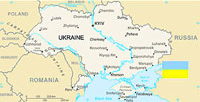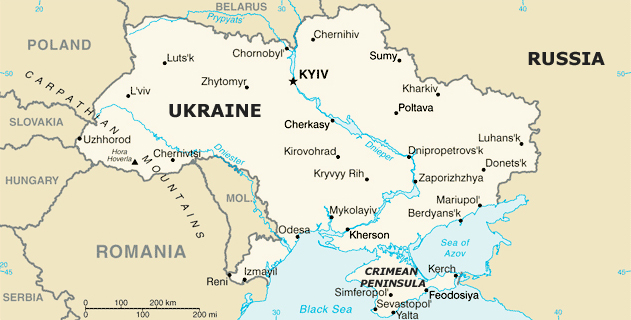Ukraine May Leave Crimea’s Fate to Next Generation, Premier Says

(Bloomberg – bloomberg.com – Volodymyr Verbyany and Kateryna Choursina – December 30, 2014) Ukraine may have to leave the fate of Crimea to future generations, Prime Minister Arseniy Yatsenyuk said, a day after the president said the country can’t afford to take back its rebel-held areas by force.
The government in Kiev and its allies have condemned the March annexation of the Black Sea peninsula by Russian President Vladimir Putin’s government. The U.S. and the European Union have imposed economic sanctions on Russian companies, individuals and industries that have compounded an almost 50 percent drop in oil prices to tip Russia’s economy toward recession.
“There’s no quick and simple answer to how to bring Crimea back to Ukraine,” Yatsenyuk said today at a year-end news conference in Kiev. “Crimea was, is, and always will be Ukrainian territory. If God helps us while we are alive, we will be able to reinstate control over Crimea. If not, our children or grandchildren will do this.”
Ukrainian officials are focusing on diplomacy to secure an enduring truce in what has grown into the worst dispute between Russia and its Cold War foes since the fall of the Iron Curtain. The government has paused a military offensive started in April aimed at driving the pro-Russian separatists from the eastern Donetsk and Luhansk regions, where fighting has killed more than 4,700 people, according to UN estimates.
Diplomatic Track
The Black Sea peninsula, where Russia maintains a naval base, was Russian territory until 1954 when Soviet leader Nikita Khrushchev transferred it to Ukraine, a move Putin called a mistake that needed to be rectified. Putin has called Crimea an “inalienable” part of Russia and this month likened it to his country’s “Jerusalem.”
He took over Crimea following the ouster of former pro-Russian Ukrainian President Viktor Yanukovych, who fled the country in February after more than 100 people died in clashes with police during anti-government protests in Kiev. After the annexation, armed separatists occupied government buildings in other parts of Ukraine and clashed with government forces in fighting that evolved into the current conflict.
President Petro Poroshenko said yesterday that Ukraine doesn’t have the resources to mount an offensive against the separatist and doing so would risk an all-out confrontation with Russia, which the government says is supplying the rebels with weapons, arms and fighters. While Putin has declared “respect” for the militants’ aim of leaving Ukraine and joining Russia, he’s denied involvement.
Military Machine
“There’s no military solution in Donbas,” Poroshenko said, referring to the area where pro-Russian rebels are pitted against government troops. “If someone wants to have a go — take up weapons and face the bullets of the Russian military machine, the strongest on the continent — let’s see how that ends.”
Poroshenko said he’ll meet Putin, German Chancellor Angela Merkel and French President Francois Hollande in the Kazakh capital Astana on Jan. 15. Talks between separatists and representatives of Ukraine’s military will also continue on Dec. 31 in Luhansk, a news website run by the self-proclaimed Donetsk People’s Republic reported yesterday.
Markets Roiled
The conflict has roiled markets in Ukraine and Russia. Ukraine’s hryvnia was little changed at 15.82 against the dollar at 4:43 p.m. in Kiev. The yield on Ukraine’s 2017 dollar bond jumped 3.8 percentage points to 33.832 percent, according to data compiled by Bloomberg. The ruble gained 3.4 percent to 56.35 against the dollar. It’s down 42 percent this year, becoming the world’s second-worst performing currency after the hryvnia.
Ukraine’s economy probably shrank 7.5 percent this year, after the conflict helped trigger a “full-scale” financial crisis, central bank Governor Valeriya Gontareva said today at a briefing in Kiev. The Ukrainian banking industry is “non-functioning,” and the rate of the hryvnia reflects its true value, Gontareva said.
“There is a full-scale financial crisis,” Gontareva told reporters. “We can only overcome it if we implement quick and even extreme reforms.”
Ukrainian lawmakers approved a 2015 budget yesterday, taking another step toward unlocking future tranches of a $17 billion International Monetary Fund-led bailout. The central bank expects to receive three tranches in early 2015, including two delayed tranches that were due this year.
The government is trying to expand the rescue package, with the European Union saying Ukraine needs another $15 billion to stay afloat next year. The country is seeking at least $10 billion to stave off default and needs an international donor conference to prevent default, Yatsenyuk said Dec. 11.
IMF Mission
An IMF mission will return to Kiev Jan. 8 and is moving “expeditiously” to continue discussion with the government on a program to stabilize the economy and restore sustainable growth, the fund’s representative in Kiev said yesterday by e-mail.
The central bank has spent $8.6 billion of its reserves, which have fallen to their lowest in more than a decade, to help state gas utility NAK Naftogaz Ukrainy pay debt for deliveries from Russian gas export monopoly OAO Gazprom this year, Gontareva said.
The central bank wants to increase its reserves to $15 billion to $23 billion, she said, from below $10 billion now. She added that the bank has worsened its 2015 inflation forecast to 17 percent to 18 percent because of an expected rise in utility tariffs.
When asked whether Ukraine would default on its debt, she said: “I don’t think Ukraine needs to be a pariah country.”
Article ©2014 Bloomberg L.P. All Rights Reserved. Article also appeared at bloomberg.com/news/2014-12-30/ukraine-may-leave-crimea-s-fate-to-next-generation-premier-says.html

